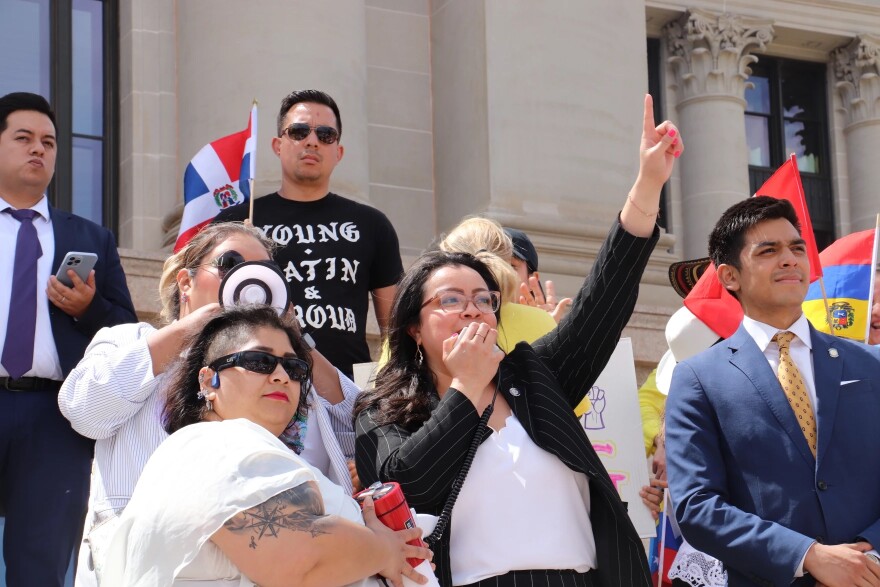Latinos in Oklahoma City appeared in the hundreds at the state capitol Tuesday. Dressed in white — for peace — some held posters high above their heads, others waved the flags of dozens of Latin American countries.
They were there to oppose House Bill 4156, a bill criminalizing anyone in the state without a legal immigration status. And while the protest was peaceful, Angelica Villalobos, an activist in Oklahoma City had a forceful message.
“I say to all those representatives that are coming against us: shame on you,” Villalobos said. “You know that immigrants are the workforce of this country. You continue saying that we don't belong. I'm here to tell you that we belong, and we're not going anywhere.”
Villalobos helped organize the rally with members of the League of United Latin American Citizens, a handful of legislative hopefuls and the state ACLU chapter.
The measure Villalobos, and the crowd that met her short speech with applause, gathered to protest against, applies disproportionately to Latinos because they make up most of the immigrant population in the state, but the language is broad and applicable to all people without legal immigration statuses.

House Bill 4156 creates a new crime in Oklahoma called “impermissible occupation,” which targets people in the country without legal permission. It’s punishable with up to a $1,000 fine and two years in prison after a second offense. The measure also prevents municipalities from independently becoming so-called sanctuary cities.
Its proposal aligns Oklahoma with a handful of other states considering border security policies, like Texas, Florida and Iowa.
Lawmakers in Oklahoma argue increased illegal immigration brings more drug and human trafficking crimes to the state. Speaker of the House Charles McCall, R-Atoka, authored the measure.
“We have several public safety issues facing the state of Oklahoma that this bill is aimed at curtailing,” McCall said.
State data shows almost 10 times more people died of fentanyl overdoses last year compared to 2019. The total pounds of fentanyl seized by law enforcement in those 5 years has skyrocketed correspondingly.
“This is a problem that our law enforcement continues to have a hard time getting their arms around,” McCall said.
He said he believes other states in the region now have a constitutional template to help them keep migrants away. Oklahoma would start laying the foundation for a sort of statutory wall, rather than a physical one.
“We believe that other states in their region will consider this legislation and Oklahoma will not be the only state passing this,” McCall said.
For that to be true, the bill still has to survive highly anticipated court challenges from civil rights groups. Lawmakers prepared for the eventuality by consulting the state Attorney General Gentner Drummond for help crafting language that’s likely to get by state judges.
The measure passed both chambers along party lines the same day of the demonstrations.
Many of the people who lapped the capitol just hours before chanting “The people, united, will never be divided,” at the top of their lungs, sat in the Senate gallery in silence as some of their representatives voted to incriminate them. But Gov. Kevin Stitt isn’t sure he’ll sign it into law.
“I'm not going to make a decision right now whether I'll sign it or not,” Stitt said. “There's too many variables.”
He says he supports a response to federal failures to secure the southern border. But heacknowledges immigrant Latino communities have much to contribute to the state.
“We have a great Hispanic population in Oklahoma. We have great entrepreneurs. That's not what we're talking about,” he said, explaining it’s not his intention to see families that have lived in the state for years be separated.
He has until next week to sign it or veto the bill. If he does nothing, it just becomes law.
House Democrat Arturo Alonso-Sandoval represents a mostly Latino district in south Oklahoma City. He says the illegal immigration problem should be addressed in a more comprehensive way.
“A way that acknowledges that, yes, there is a crisis going on within the world of immigration,” he said during a house floor debate last week. “But recognizing that we have long-term residents, undocumented Oklahomans that have contributed and will continue to contribute in countless ways to our great state.”
But attempts to amend the bill to include accountability measures in the case of wrongful arrests, or protections for people who've been paying state taxes for years, were thwarted in the House and Senate.
Instead, floor leadership immediately motioned to table the amendments, which their majority caucuses swiftly voted to approve.
The votes were an outcome Villalobos — and most of the rest of the demonstrators — expected in part because of the politics surrounding immigration in the U.S. today, and in part because so often, due to fear, the Latino community advocates for itself too little and too late, she said.
“I understand that feeling of fear. It’s completely valid,” she said, “but we can’t let ourselves be scared into inaction.”









